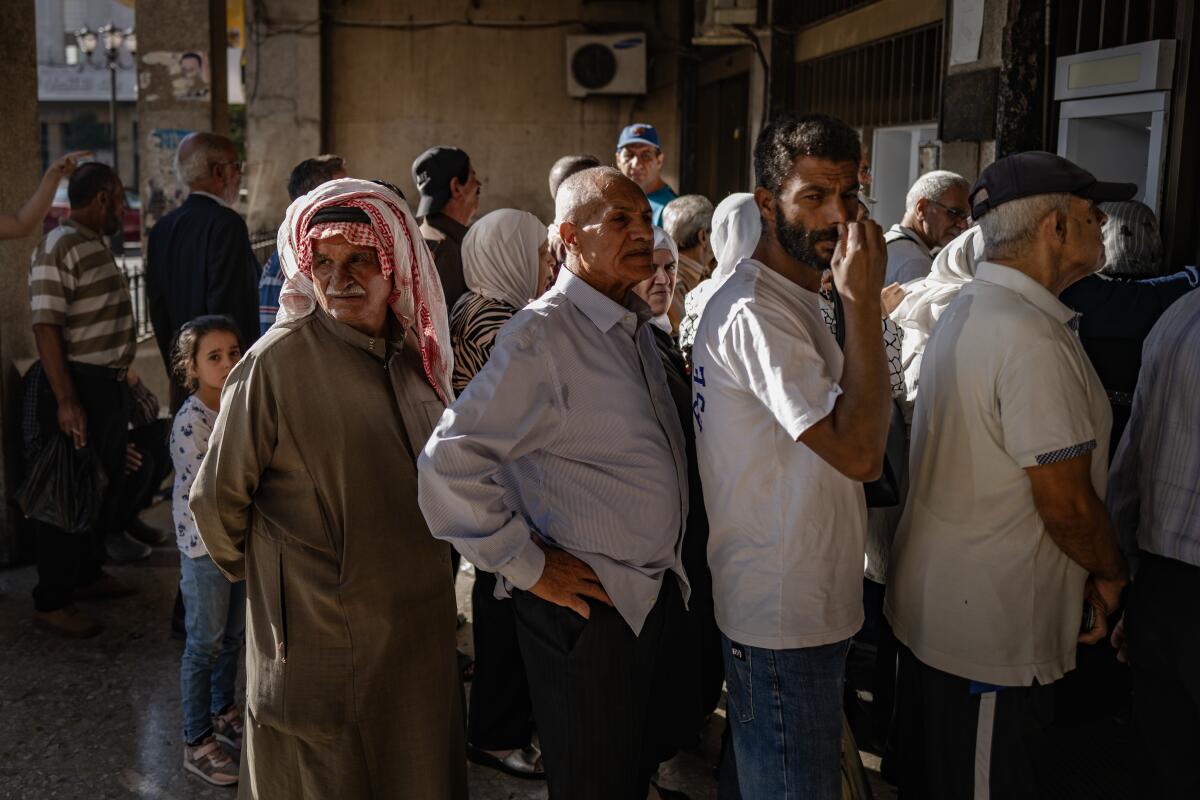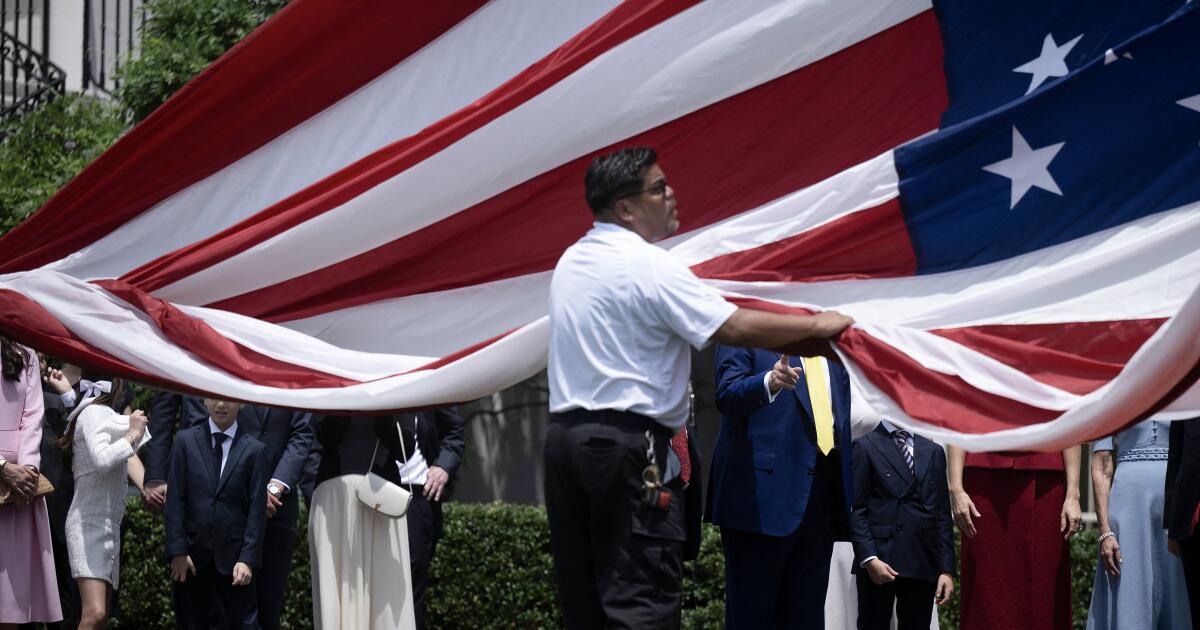DAMASCUS, Syria — Standing in the dilapidated ATM hall of his bank, Maher Elias huffed a sigh equal parts exasperation and exhaustion. Around him were lines dozens of people deep, all of them, like the 59-year-old Elias, waiting in the sweltering heat to withdraw cash.
Ahead of him was a wait of at least three hours — assuming the ATM didn’t shut down from electricity cuts or run out of bills. On one of the hottest days in the Damascene summer, his words interrupted by the occasional argument between other vexed patrons, Elias spoke while his eyes remained fixated on the front of the slow-moving queue.
“All this waiting, and for what?” he said, wiping the sweat from his brow. He could only withdraw 200,000 Syrian pounds (around $20) for the week.
“And we’re five people in my family. Between food, gas and rent, how long do you think that lasts?”

People queue up to enter Damascus’ Real Estate Bank to use a functioning ATM.

A stack of money sits on a desk in a bank. Syria’s banking and financial sectors are a shambles, with capital controls limiting withdrawals at about $60 per month.
Elias and the hundreds of others queuing in the lines that spilled out to the sidewalk of the Real Estate Bank of Syria were taking part in an often quixotic quest, as millions of Syrians contend with a cash crunch that resulted after former President Bashar Assad was toppled and a rebel-led government came in his stead.
For months now, withdrawing money has become almost a second job, with employees forced to take off from work to queue before banks, even as the lack of liquidity is strangling a ravaged economy struggling to shuffle off nearly 14 years of civil war.
And the worst part for Elias (and many others) was he would have to do it all over again another day so he could collect all of his 500,000 Syrian pound monthly salary — a little less than $50.
Still, as a state employee and a patron of one of Syria’s six state-owned banks, Elias was luckier than many others. Across the street, Mohammad, 63, was shouting at no one in particular in front of the private bank where he has his account. He had come with his granddaughter, 6-year-old Masa, from his home in a Damascus suburb, hoping to plead with a manager to OK a larger withdrawal.
But the manager told him there was no cash available; the ATMs weren’t even on. Mohammad, who gave his first name for reasons of privacy, didn’t have enough money for bus fare to go home.
“What am I supposed to do? Beg on the street? I’ve been coming for weeks, and these bastards refuse to give me my money,” he said, angrily pointing at the bank’s entrance. Masa looked at her grandfather and didn’t say a word.

A man reloads an ATM’s depleted stock of Syrian pounds in Damascus.
Sitting in his office, the bank manager, who refused to be identified because he was not allowed to speak to the media, insisted he had no choice but to turn away Mohammad and other patrons. Private banks, he said, were supposed to receive $20,000 in cash from the central bank every day. But more often than not, the banks got less, or nothing at all.
“And even when the cash does arrive, it’s barely enough to cover the number of withdrawals,” the bank manager said. Moments later, a businessman entered his office seeking a withdrawal amounting to $500 to pay his bills; he too left empty-handed.
When Syria’s new rulers came into power after a lightning fast offensive in December,they commandeered the Assad government’s financial institutions and took stock of a state-controlled economy enfeebled by war, corruption and sanctions: The Syrian pound, once valued at 47 to the U.S. dollar, plunged to 18,000 by the time Assad fled, turning most transactions into an arduous counting exercise involving sackfuls of pre-wrapped bricks of cash, each weighing more than a pound.
The exchange rate has since improved — if you can call it improvement — to around 11,000 to the dollar.
The economy’s output remains less than half of what it was in 2010, before the civil war erupted. A quarter of the country’s 26 million people live on less than $2.15 a day, according to a World Bank assessment in June. Two-thirds get by on less than $3.65 a day. Rebuilding the country will cost anywhere from $250 billion to $400 billion, estimates say.

A row of broken ATM’s inside Real Estate bank in Damascus.

The face of ousted Syrian President Bashar Assad decorates Syrian pounds.
The banking sector is no less destroyed. Civil war-era sanctions all but isolated Syrian banks from the global financial system. Although President Trump recently ordered many of those sanctions lifted, and European governments have done the same, Western banks are still reluctant to move the massive amounts of money needed for reconstruction.
The new authorities swiftly loosened Assad-era restrictions, deluging the market with cheaper imports and lifting a moratorium that made dealing with dollars a criminal offense. They also imposed withdrawal limits, possibly in an attempt to prevent a run on the banks and stop former regime officials from emptying their accounts and fleeing.
But nine months on, the limits persist with little clarity as to why, according to bank employees and economic experts. The World Bank reported a shortage of physical bank notes, despite a 105-fold increase in the amount of currency between 2011 and 2024. It added that recent planeloads of bills printed in Russia — which had a monopoly on producing Syrian pounds under Assad — were too small to meaningfully alleviate the liquidity crisis.
Meanwhile, Syrians unable to access their bank accounts are relying on informal money changers — banned under Assad, but now flourishing — to buy Syrian pounds with gold or dollars they had amassed during Assad’s reign, despite the restrictions. Experts say such transactions are occurring at an artificially lowered exchange rate.
“This appears to be a systematic policy aimed at pulling dollars from people in a country where the dollar has been unleashed, and has become the main source of revenue because of remittances,” said Samir Aita, a Syrian economist who also heads the Circle of Arab Economists.
“Where are those dollars going? To the central bank? It seems not. This is something that keeps me up at night,” Aita said.

A customer passes U.S. dollars to a money collector. Possessing dollars was a crime when President Bashar Assad was in power.
Ammar Yusef, a Damascus-based economic expert, agreed with Aita’s assessment, adding that hard currency gathered by money changers is said to have been sent to the northwestern province of Idlib, for years the primary home of the Islamist group Hay’at Tahrir Al-Sham (or HTS) that ousted Assad.
One solution authorities have recently turned to for the cash crunch is e-payments. Earlier this year, they decreed all public sector salaries would be disbursed through Sham Cash, an app HTS first released in Idlib but that technical experts say is insecure and is linked to an Idlib-based bank that is not recognized by the central bank.
It’s unclear whether the app has the capacity to deal with an estimated 1.25 million civil servants, and whether it meets Western governments’ requirements on combating money laundering and terror financing — essential components to increasing trust in the country’s financial system.
Other experts point to serious concerns on fees charged by the two money transfer companies exclusively licensed to disburse money from Sham Cash. Both are considered close to the new government, and stand to collect more than $3 million annually in commissions.
“They’re in an open battle today with the country’s banks,” Aita said.
The government’s recently announced plans to redenominate the currency and eliminate two zeroes from each bill, he added, will do little to change the situation.

Inside Damascus’ Real Estate bank, with reflections from the Syrian capital outside.
Yet these machinations mean little for Elias. After waiting for almost four hours, and forced to switch queues twice before he encountered a functional ATM, he withdrew his Syrian pounds for the day. He would use them to buy bread and other essentials. He wouldn’t be able to take out money again for a few days.
“It feels like half the week is gone lining up for cash,” he said, huffing once more as he pushed through the crowds out of the ATM hall.



